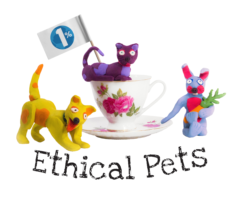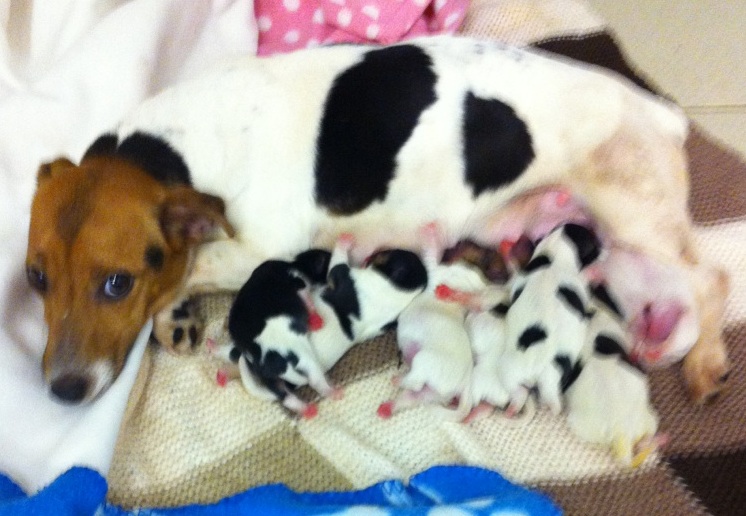We all know what a positive effect our pets can have on our lives. For some, letting those precious pets be a part of someone else’s life too, allows this wonderful charity to reach out to thousands of people each week, sharing the benefits of unconditional love and companionship that these wonderful animals can bring. This charity is Pets as Therapy – this week, Shep, our adorable rescue mutt, interviews them about what they do.
Category: Interviews
Ethical Pet of the Month – September 2013
Pip and Arty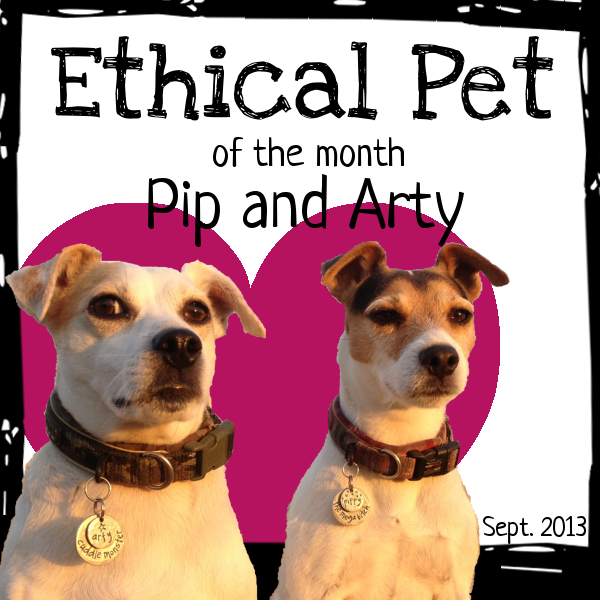
Ethical Pets of the Month, September 2013
This month we have super-cute caring duo Pip and Arty as our Ethical Pets of the Month! Here are a few words from Darren, Pip and Arty’s dog-walking daddy:
We re-homed Pip & Arty three years ago this month. Their previous owners could no longer take care of them because their relationship was breaking down & they felt they were being neglected. We came across an advert explaining their situation & instantly fell in love with them.
Continue reading “Ethical Pet of the Month – September 2013”
Ethical Buisness: Ethical Life. Vol 5.
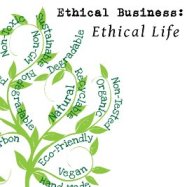 Meet Claire. She’s a real force of nature and yes… we have found in her yet another Ethical Business Superstar! Claire’s thing is Bikes: she likes riding them, fixing them… she even Married a bicycle repair man! Oh, and the other thing she does with bikes is up-cycle them into gorgeous jewelery and accessories. Yes. She is very very cool! Read more about Claire in our interview with her below, and checkout her web-shop too!
Meet Claire. She’s a real force of nature and yes… we have found in her yet another Ethical Business Superstar! Claire’s thing is Bikes: she likes riding them, fixing them… she even Married a bicycle repair man! Oh, and the other thing she does with bikes is up-cycle them into gorgeous jewelery and accessories. Yes. She is very very cool! Read more about Claire in our interview with her below, and checkout her web-shop too!
Way back, where did all of this eco stuff this begin for you?
From an early age, I always had a pencil in my hand. Apart from when I was running around or swinging off something. I started a fine art degree which seemed the natural thing to do, but found it wasn’t what I expected. I moved away from art and design for a few years and spent my time in community work with children and young people, which I love. But my creative streak and love of design always stayed with me. Since I was a child I was very aware of our impact on the world. I spent time raising money for environmental charities like GreenPeace. I was horrified that we were responsible for a hole in the ozone layer, or chopping down rainforests.
Buying a mountain bike in my late 20’s changed my life. It led me to my local bike shop, where I was to meet mechanic Rob (now the shop owner – and my husband!) Spending years riding together developed my love of all things ‘bicycle’.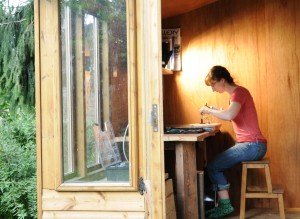
So, when did you start Bits of Bike, why and how did it go?
I don’t like waste. I do like the unusual. Surrounded by junk at the bike shop, I felt inspired to recycle the scrap into something unique. My first endeavor was making coat hooks out of some old racing bike handle bars. The result was a striking, distinctive and functional object, saved from the junk heap! I began to get compliments on my designs. Then came the jewelery, and other ideas began to flow. From this, ’Bits of Bike’ began to evolve.
What kit did you need to begin with?
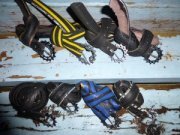
I started with nothing but a collection of waste bicycle items. I needed to buy some basic workshop tools and ‘jewelery findings’ (clasps, necklace end caps etc). At present, I make all the packaging myself from recycled card, and mountain bike magazines.
How did you start selling things?
At first I thought I would venture out to local craft fairs. Sales wise, this was hit and miss, but I got positive feedback. I decided to develop my website. I used the open-source web design tool, ‘Wordpress’. It really suited my needs, and I am grateful of such an amazing, free resource. I barely advertised and it was a couple of months before I got my first on-line sale. I bounced around the house for about half an hour. I still get butterflies every time I make an online sale!!
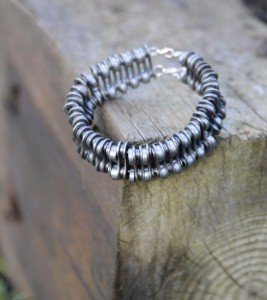
So far, it has been hard to juggle a full time job with developing Bits of Bike on the side. On the other hand, I have had the financial stability to develop the initial stages of Bits of Bike. However, I was recently redundant from the public sector and so I am giving BitsofBike a go full time. I am expecting to need to have another income too at some point. It is exciting and scary. But it feels so good to be in control and doing something positive and productive.
Where do you think Bits of Bike is going?
My goal is to develop an ethical urban cycle clothing and accessories company. At this early stage, whatever I make mostly goes straight back into growing BitsofBike. In five years, I would like to make my company and my life carbon neutral. But for now, I am just aiming towards making enough to paying my bills!
Describe an average day in the life of you.
My workshop is at the bottom of my garden. I am up and at it by 8:30am after an essential cup of tea. I prefer to have the doors wide open to listen to the birds which makes me happy and keeps me motivated. I will spend a lot of my day making things for orders that have come in, or to add to my website. An integral trip to the post office to send out any orders takes place mid afternoon. Variety is the spice of life, so there is always time fo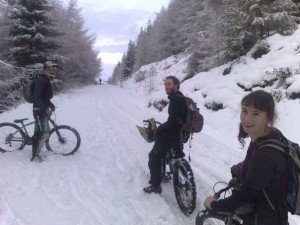 r experimentation and design. Music and dancing keeps the spirit up (and the toes warm mid winter). I don’t stop work till my head is whizzing and my stomach rumbles around 7pm.
r experimentation and design. Music and dancing keeps the spirit up (and the toes warm mid winter). I don’t stop work till my head is whizzing and my stomach rumbles around 7pm.
What else do you do?
I committed to volunteering for Sustrans sustainable transport, and Breeze Cycle Network, to encourage more women to get out on their bikes.
Do you have any pets?
We have a rescue boa constrictor. She has a large enclosure in our bedroom. Mum wont come to stay because of her.
Do you  have a conventional or unusual life style
have a conventional or unusual life style
I see myself as pretty conventional. I try to be conscious of my impact on the world. This influences my lifestyle. I love growing my own food on our allotment. There is nothing better that making a meal that I have nurtured myself from seed. My clothes all come from charity shops! A product of our throw-away society is that I get to have nice but cheap clothes, and support charities. I need time for myself playing out in the woods with my husband on my mountain bike. I like to feel close to nature. I like to be outside. Whatever the weather. Also, everyday I ride my bike. To commute or to have fun. I rarely drive.
What are your ethical principles and how do they guide and motivate you?
There are so many causes that inspire me. In general, personal and social responsibility is really important to me. It’s human nature to want to advance and move forward. But having the world and each other at the core of what we do is key. There are so many sustainable resources around us. Its just doesn’t make sense to me to do it any other way.
Any words of wisdom?
It may be cheesy, but I fell in love with ‘Desiderata’ as a teenager. My favorite quote is from this poem:
” You are a child of the universe, no less than the trees and the stars;
you have a right to be here.
And whether or not it is clear to you, no doubt the universe is unfolding as it should.”
Meet Claire. She's a real force of nature and yes... we have found in her yet another Ethical Business Superstar! Claire's thing is Bikes: she likes riding them, fixing them... she even Married a bicycle repair man! Oh, and the other thing she does with bikes is up-cycle them into gorgeous jewellery and accessories. Yes. She is very very cool! Read more about Claire in our interview with her, and checkout her web-shop too!
Ethical Buisness: Ethical Life. Vol 4.
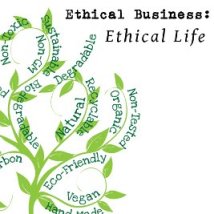 This month we meet Paula from Fossbox. Fossbox is a non-profit social enterprise that specializes in what I suppose you could call “ethical computing.” They work with universities, museums, non-profits, cooperatives and social enterprises and specialize in “open source web-based software including e-publishing, open access information management and collaborative communities.” This computer stuff may be an area of ethical living that you are totally unfamiliar with, but still, read on… it may all start to sound very familiar!
This month we meet Paula from Fossbox. Fossbox is a non-profit social enterprise that specializes in what I suppose you could call “ethical computing.” They work with universities, museums, non-profits, cooperatives and social enterprises and specialize in “open source web-based software including e-publishing, open access information management and collaborative communities.” This computer stuff may be an area of ethical living that you are totally unfamiliar with, but still, read on… it may all start to sound very familiar!
Whe n did you start your ethical business and why?
n did you start your ethical business and why?
I wanted to be independent and to be able to prioritize loving what I do over profit. Of course, I need to make a living – but in a way which is consistent with my own values. I started the business in my early 50s so I’d done quite a lot before, at the time I was working on a project to help charities use technology better. The prejudice and opposition towards Free, Libre and Open Source Software (FLOSS) in the sector in general, and the organizations I worked for in particular, was extremely frustrating. So, I decided to bypass it by setting up Fossbox – I got support from Technology and Social Action and something called ‘Designing for the 21st Century’ ESRC collaboration funding. Other than T&SA, the entire world informed me I couldn’t make a social enterprise based solely on FLOSS work in the UK – but so far we’ve survived 4 years, a triple-dip recession and neo-cons taking a scythe to the voluntary and public sectors.
How long was it till you got your first sale?
I had sales lined up before I launched.
How much money did you have to start off with?
I started off with a £4k commission and turned over £20k in the first year. We were building on that nicely but the recession hit us and then the funding cuts in 2011/2012 halved our income overnight (because we work with non-profits). We’re regrouping and actually expanding now, but the past couple of years have been very tough.
Describe an average day in the life of you.
I don’t have an average day
Ok – gotcha! So, do you have other jobs too? Do you have a family/hobbies/pets? Do you have a conventional or unusual life style? What things do you do every day, sometimes, or never?
No other jobs. I have a cat, and my lifestyle is generally considered to be rather unconventional. Things I do every day pretty much boils down to having breakfast and coffee, then brushing my teeth… after that, I don’t really remember most days 😉 I don’t have time or inclination for hobbies. Possibly I should mention that I’m gay.
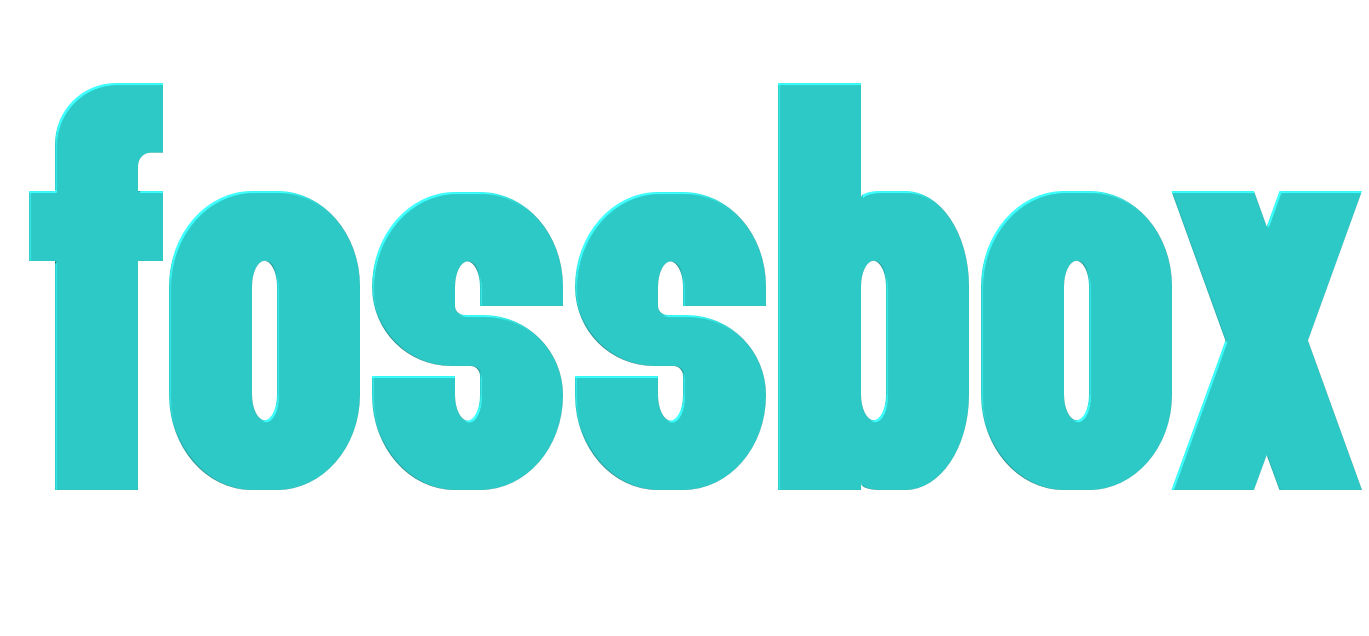 What are your ethical principles?
What are your ethical principles?
People before profit. I started my own business because I couldn’t get done what I wanted to get done any other way (and because I was tired of the contemporary obsession with HR). We advocate Free and Open Source Software and support more women to get involved in technology. The former based on the general principle of people before profit: software should be developed independently and collaboratively to fit human purpose rather than warping it. The latter because I don’t want younger women to experience the hell that my generation of independent women had to deal with. I’d like to be more upbeat but it’s been a tough couple of years.
Any words of wisdom?
You can’t please all the people all the time so please yourself.
Favorite quote?
It is easy to be independent when you’ve got money. But to be independent when you haven’t got a thing, that’s the Lord’s test — Mahalia Jackson.
I did everything he did, but backwards and in high heels — Ginger Rogers
Things you would share with the next generation of people like you
Imagine you’re descended from a long line of mystical female warriors and don’t take any crap unless you’re feeling kind and can afford it 😉
Want to read more articles like this? Sign up to our newsletter!
An Interview with The Fox Project
The Fox Project is a wildlife hospital, information bureau and humane deterrence consultancy, all specializing in the Red Fox.
 What does The Fox Project have planned for 2013?
What does The Fox Project have planned for 2013?
Pretty much going on as we are. Last year, we moved into a new wildlife hospital, which took everything up a notch. It would be nice if we could have a quiet year – time and space to settle in.
 No! Last year we admitted 640 casualty foxes and THAT was a quiet year, possibly because the fox population fell slightly – a natural phenomena with self-regulating species like the fox. But we normally take in around 750 per year and I expect 2013 will be typical.
No! Last year we admitted 640 casualty foxes and THAT was a quiet year, possibly because the fox population fell slightly – a natural phenomena with self-regulating species like the fox. But we normally take in around 750 per year and I expect 2013 will be typical.
Is the new wildlife hospital making a difference to what you can do?
 Yes. The Fox Project has struggled for 20 years with converted premises, spending valuable funds on annual renovations just to stand still. We’ve always prided ourselves on hygiene and efficiency but it’s so much easier when everything is new and designed for the purpose.
Yes. The Fox Project has struggled for 20 years with converted premises, spending valuable funds on annual renovations just to stand still. We’ve always prided ourselves on hygiene and efficiency but it’s so much easier when everything is new and designed for the purpose.
I suppose spring, when the cubs are born, is your busiest period?
We usually receive around 250 cubs along with all the adult foxes. Vixens are only in season for three days a year, all around the same time. Because of that concentration, half the year’s patient intake arrives in one quarter of the year! The majority are rescued by our three wildlife ambulance drivers and 40 local volunteer rescuers. Others come from RSPCA and organizations outside our area that don’t have suitable facilities.
usually receive around 250 cubs along with all the adult foxes. Vixens are only in season for three days a year, all around the same time. Because of that concentration, half the year’s patient intake arrives in one quarter of the year! The majority are rescued by our three wildlife ambulance drivers and 40 local volunteer rescuers. Others come from RSPCA and organizations outside our area that don’t have suitable facilities.
What happens with the cubs? How do you get them back to the wild when they’ve become accustomed to humans?
 Even those brought up on the bottle usually revert to wild by the time they’re twelve weeks old. Humans are useful in that they bring food and water and change the sawdust but that’s their only real purpose! But of course, we have a well-regulated program to prevent and undo bonding between cubs and humans. We must have this, or they could go back to the wild trusting people and that’s not in their best interest.
Even those brought up on the bottle usually revert to wild by the time they’re twelve weeks old. Humans are useful in that they bring food and water and change the sawdust but that’s their only real purpose! But of course, we have a well-regulated program to prevent and undo bonding between cubs and humans. We must have this, or they could go back to the wild trusting people and that’s not in their best interest.
 How do you feel about the adverse publicity some newspapers give to foxes?
How do you feel about the adverse publicity some newspapers give to foxes?
Without wanting to sound like a conspiracy theorist, some of those papers  have a pro-hunting agenda and support repeal of the Hunting Act. We always do what we can try to investigate stories about foxes attacking people and no case thus far stands up to scrutiny. There’s usually a hidden agenda, like wanting the local authority to remove foxes from someone’s property – which, as foxes are not classified as ‘vermin’, councils are not legally obliged to do. Sometimes it’s an attempt to divert attention from an attack on a child by the family’s own pet and to avoid the media shame that would inevitably follow. But the most common fears are based on simple misunderstandings.
have a pro-hunting agenda and support repeal of the Hunting Act. We always do what we can try to investigate stories about foxes attacking people and no case thus far stands up to scrutiny. There’s usually a hidden agenda, like wanting the local authority to remove foxes from someone’s property – which, as foxes are not classified as ‘vermin’, councils are not legally obliged to do. Sometimes it’s an attempt to divert attention from an attack on a child by the family’s own pet and to avoid the media shame that would inevitably follow. But the most common fears are based on simple misunderstandings.
 How do you combat that misunderstanding?
How do you combat that misunderstanding?
Ye ars before we opened a wildlife hospital The Fox Project was a fox information bureau. It still is, and an important aspect of that is to make knowledge of the species readily available. Like so much in life, it’s an ongoing battle of truth and reality v. myth and prejudice.
ars before we opened a wildlife hospital The Fox Project was a fox information bureau. It still is, and an important aspect of that is to make knowledge of the species readily available. Like so much in life, it’s an ongoing battle of truth and reality v. myth and prejudice.
 It’s an admirable survivor, intelligent, resourceful, adaptable, humorous, good natured and beautiful – traits we might admire in the best of people. It has suffered too long from ignorance and superstition. We owe it.
It’s an admirable survivor, intelligent, resourceful, adaptable, humorous, good natured and beautiful – traits we might admire in the best of people. It has suffered too long from ignorance and superstition. We owe it.
[print_gllr id=780]
Shep: Reporting Live Vol.1
Shep recently interviewed Sarah Graham, Communications Assistant at The Dogs Trust. Here is a full transcript.
 Christmas was fun for me, I slept by the fire mostly. What do the dogs in Dogs Trust sanctuaries do at Christmas?
Christmas was fun for me, I slept by the fire mostly. What do the dogs in Dogs Trust sanctuaries do at Christmas?
 Once they are all cleaned and fed, all the dogs go for lovely long walk. Staff spend all day with the dogs to make sure they all enjoy their day and get lots of fuss and attention. All the dogs will also get a special treat out of their stocking – a special chew or a toy. All the dogs have stockings and the sponsored dogs proudly display their Christmas Cards from their sponsors. There is a Christmas tree in reception and the staff wear festive Santa hats.
Once they are all cleaned and fed, all the dogs go for lovely long walk. Staff spend all day with the dogs to make sure they all enjoy their day and get lots of fuss and attention. All the dogs will also get a special treat out of their stocking – a special chew or a toy. All the dogs have stockings and the sponsored dogs proudly display their Christmas Cards from their sponsors. There is a Christmas tree in reception and the staff wear festive Santa hats.
So do people still get Dogs for Christmas (and not for life?)
 I’m afraid so. 34 years ago Dogs Trust created the famous slogan “A Dog is for Life, Not Just for Christmas” – but sadly it appears that many people still buy dogs as presents without proper thought being given to the responsibilities involved. Each year we see around 100 dogs dumped at our re-homing centres over the Christmas period. We regret to say that 2012 was no different. It seems that people are still giving puppies as Christmas presents without considering the long term ramifications. Dogs can provide a world of happiness and enjoyment, and we urge anyone considering a new addition to the family to ‘think life’ and carefully consider the individual needs of the dog’s breed too.
I’m afraid so. 34 years ago Dogs Trust created the famous slogan “A Dog is for Life, Not Just for Christmas” – but sadly it appears that many people still buy dogs as presents without proper thought being given to the responsibilities involved. Each year we see around 100 dogs dumped at our re-homing centres over the Christmas period. We regret to say that 2012 was no different. It seems that people are still giving puppies as Christmas presents without considering the long term ramifications. Dogs can provide a world of happiness and enjoyment, and we urge anyone considering a new addition to the family to ‘think life’ and carefully consider the individual needs of the dog’s breed too.
 Where do all the Christmas dogs come from?
Where do all the Christmas dogs come from?
 Sadly one of the most popular places to buy dogs is online. Dogs Trust acknowledges that the Internet is an accessible way of purchasing gifts quickly, but the impulse buying of pets and animals poses the enormous risk of attracting many unscrupulous breeders. Consumers could, unintentionally, end up purchasing a pet from a puppy farm that has been trafficked into the UK. Such puppies often have physical and behavioral problems as a result of poor breeding conditions and traumatic transportation. To help prevent people thoughtlessly buying or giving a dog as Christmas present, Dogs Trust centers did not re-home dogs between the 22nd and 29th of December (22nd December to 2nd January in Scotland). People were still able to visit and reserve a dog, but were not be able to take it home until the New Year
Sadly one of the most popular places to buy dogs is online. Dogs Trust acknowledges that the Internet is an accessible way of purchasing gifts quickly, but the impulse buying of pets and animals poses the enormous risk of attracting many unscrupulous breeders. Consumers could, unintentionally, end up purchasing a pet from a puppy farm that has been trafficked into the UK. Such puppies often have physical and behavioral problems as a result of poor breeding conditions and traumatic transportation. To help prevent people thoughtlessly buying or giving a dog as Christmas present, Dogs Trust centers did not re-home dogs between the 22nd and 29th of December (22nd December to 2nd January in Scotland). People were still able to visit and reserve a dog, but were not be able to take it home until the New Year
 Were there any Dogs Trust miracles this Christmas?
Were there any Dogs Trust miracles this Christmas?
 Dogs Trust Glasgow was broken into four times during the Christmas period. Not only did the charity lose equipment, but some of the dogs became very distressed by the trauma and the centre was forced to close for a short period of time. In the midst of this turmoil, however, a Christmas miracle took place as dedicated staff helped a three year old Jack Russell Terrier, called Josie, give birth to a litter of seven pups on Christmas eve. The pups are all doing really well and have all been reserved to go to their loving new homes when they are old enough.
Dogs Trust Glasgow was broken into four times during the Christmas period. Not only did the charity lose equipment, but some of the dogs became very distressed by the trauma and the centre was forced to close for a short period of time. In the midst of this turmoil, however, a Christmas miracle took place as dedicated staff helped a three year old Jack Russell Terrier, called Josie, give birth to a litter of seven pups on Christmas eve. The pups are all doing really well and have all been reserved to go to their loving new homes when they are old enough.
Here’s Josie and her pups, all doing well!
